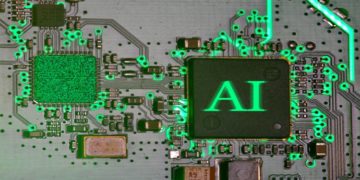In the dynamic world of finance and virtual currencies, Bitcoin has emerged not simply as a progressive form of decentralized money but also as a compelling asset for buyers seeking new possibilities. As the hobby of Bitcoin grows, so does the mixing of modern-day technologies like artificial intelligence (AI) into funding strategies. Quantum Hancock, an investment education firm, plays a pivotal role in connecting traders with educational experts, facilitating deeper insights into AI applications in Bitcoin investment through predictive analytics and data-driven strategies. This article explores how AI is shaping the landscape of Bitcoin investment via predictive analytics and information-driven insights.
Understanding AI in Bitcoin Investments
Artificial intelligence, a branch of computer technology that simulates human intelligence in machines, is being increasingly applied in monetary markets to investigate massive quantities of facts quickly and successfully. In the context of Bitcoin funding, AI algorithms can sift through ancient fee information, market tendencies, social media sentiment, and different applicable factors to pick out styles and make predictions about future fee moves.
AI-powered equipment and systems cater to individual traders and institutional gamers, supplying state-of-the-art analytics that are useful resources in selection-making methods.
Predictive Analytics in Bitcoin Investment
Predictive analytics forms the cornerstone of AI programs in Bitcoin funding. By studying ancient price records and identifying habitual patterns, AI algorithms can forecast ability fee developments and marketplace behaviors. This predictive capability enables investors to anticipate market movements and optimize their trading techniques as a consequence.
For instance, AI fashions may also analyze elements that include buying and selling volumes, volatility styles, macroeconomic indicators, or even global information activities to generate predictions about Bitcoin’s fee course.
Data-Driven Insights and Decision-Making
Beyond predictive analytics, AI generates statistics-driven insights that offer a deeper understanding of Bitcoin’s marketplace dynamics. AI algorithms can discover correlations between extraordinary variables that impact Bitcoin fees, supplying nuanced insights that human analysts may forget.
Moreover, AI-pushed sentiment analysis tools monitor social media structures, information articles, and online forums to gauge public belief and sentiment toward Bitcoin. This sentiment analysis helps investors gauge market sentiment developments and shifts, which can have an impact on short-term price moves.
AI-Powered Trading Strategies
AI’s integration into Bitcoin funding extends to the improvement of automated buying and selling techniques, regularly called algorithmic buying and selling or “quant” buying and selling. These strategies execute trades primarily based on predefined standards and regulations set by way of AI algorithms, along with rate thresholds, technical indicators, or marketplace sentiment signals.
Algorithmic trading powered by AI operates at excessive speeds and might execute trades within fractions of a second, exploiting fleeting marketplace possibilities that human investors may pass over. This functionality now not only complements trading efficiency but additionally reduces the emotional biases inherent in human selection-making.
Risk management and Portfolio Optimization
AI’s function in Bitcoin investment additionally encompasses danger control and portfolio optimization. AI algorithms can check portfolio overall performance, analyze threat exposures, and advocate modifications to optimize threat-go-back profiles. By constantly tracking marketplace situations and portfolio dynamics, AI helps traders adapt to changing marketplace environments and mitigate potential risks.
Additionally, AI-driven portfolio control platforms provide personalized funding tips based totally on individual risk tolerances, investment desires, and market situations. These platforms empower traders to construct diversified portfolios tailored to their unique preferences and goals.
Challenges and Considerations
While AI holds an awesome ability to enhance Bitcoin investment strategies, several challenges and concerns ought to be addressed:
Data Quality and Bias
AI models heavily rely on record quality and may be vulnerable to biases inherent in historical facts. Ensuring easy, reliable information inputs is vital to preserving the accuracy and reliability of AI-pushed predictions.
Regulatory Compliance
The regulatory panorama surrounding Bitcoin and AI in finance is evolving. Compliance with regulatory requirements and making sure transparency in AI-driven choice-making tactics are paramount to building acceptance as true and legitimate.
Overfitting and Model Robustness
AI fashions ought to strike a balance between becoming historical records (overfitting) and adapting to new marketplace conditions (model robustness). Continuous refinement and validation of AI algorithms are important to avoid over-reliance on historical styles that may not repeat.
Conclusion
In conclusion, AI is reworking the panorama of Bitcoin funding via its competencies in predictive analytics, records-driven insights, automated buying and selling techniques, and portfolio optimization. As buyers navigate the complexities of digital assets like Bitcoin, AI gives them powerful tools to analyze market traits, control dangers, and capitalize on opportunities in real time. While challenges continue to exist, the combination of AI and Bitcoin funding underscores its ability to reshape how investments are made and managed within the digital economic system. As the era continues to conform, so too will AI’s role in shaping the destiny of Bitcoin and monetary markets.
David Prior
David Prior is the editor of Today News, responsible for the overall editorial strategy. He is an NCTJ-qualified journalist with over 20 years’ experience, and is also editor of the award-winning hyperlocal news title Altrincham Today. His LinkedIn profile is here.













































































